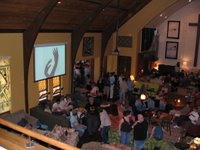



I got to experience a worship service at
Solomon's Porch in Minneapolis, MN this past Sunday night. This is one of the more well-known "emerging" churches. It's pastor,
Doug Pagitt, is the author of
Church Re-Imagined and is a leader in the
emergent movement.
I wanted to tell you a little about my time there:
the setting
- they currently meet in an old church (I believe this is the 3rd location in 7 years) and already they are bursting at the seams
- there are sofas and comfy chairs spread out throughout the sanctuary, all oriented toward the middle of the space
- there is a lot of original artwork (by church members) everywhere
- there are small tables throughout with a loaf of bread & bottles with grape juice
- two projection screens are on opposite walls
- all the songs they sing are original compositions by the band (apparently they started with 2 songs that they sang a lot)
- there were lots of kids crawling over couches & zooming here & there (apparently the single folks like to grab seats in the balcony to have a more quiet time)
the experience (as I can recall)
- 5:00pm start was really something like 5:20pm
- no introduction, the band just starts playing and the lyrics appear and folks settle down
- corporate prayer
- passing of peace (encouraged to move around and meet others)
- commitment to faith journey (for any new members that join with kids, they have a sort of re-commitment to baptismal promise ceremony to reaffirm that this community will continue to nurture child in faith)
- kids dismissed to breakout sessions
- member sharing their faith story (this evening was a member and her Jewish friend, talking about their friendship and faith journeys)
- preaching (Doug just had a few words this time - he sits in the middle of the room on a stool and circles around as he talks, apparently there is discussion during this time, also anyone can participate in worship planning session during a Bible discussion group on Tuesday evening)
- small group breakout (this team we broke into small groups with other emergent leaders sitting near us)
- communion (is emphasized as more of a meal with community, it is self-administered and there is time to share with others)
- the songs were amazing, especially considering they are all original
I also attended the Summer Institute at Solomon's Porch last week. Read about my experience there @
my blog.




